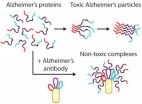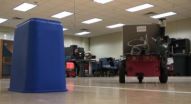(Press-News.org) Troy, N.Y. – Antibodies developed by researchers at Rensselaer Polytechnic Institute are unusually effective at preventing the formation of toxic protein particles linked to Alzheimer's disease and Parkinson's disease, as well as Type 2 diabetes, according to a new study.
The onset of these devastating diseases is associated with the inappropriate clumping of proteins into particles that are harmful to cells in the brain (Alzheimer's disease and Parkinson's disease) and pancreas (Type 2 diabetes). Antibodies, which are commonly used by the immune system to target foreign invaders such as bacteria and viruses, are promising weapons for preventing the formation of toxic protein particles. A limitation of conventional antibodies, however, is that high concentrations are required to completely inhibit the formation of toxic protein particles in Alzheimer's, Parkinson's, and other disorders.
To address this limitation, a team of researchers led by Rensselaer Professor Peter Tessier has developed a new process for creating antibodies that potently inhibit formation of toxic protein particles. Conventional antibodies typically bind to one or two target proteins per antibody. Antibodies created using Tessier's method, however, bind to 10 proteins per antibody. The increased potency enables the novel antibodies to prevent the formation of toxic protein particles at unusually low concentrations. This is an important step toward creating new therapeutic molecules for preventing diseases such as Alzheimer's and Parkinson's.
"It is extremely difficult to get antibodies into the brain. Less than 5 percent of an injection of antibodies into a patient's blood stream will enter the brain. Therefore, we need to make antibodies as potent as possible so the small fraction that does enter the brain will completely prevent formation of toxic protein particles linked to Alzheimer's and Parkinson's disease," said Tessier, assistant professor in the Howard P. Isermann Department of Chemical and Biological Engineering at Rensselaer. "Our strategy for designing antibody inhibitors exploits the same molecular interactions that cause toxic particle formation, and the resulting antibodies are more potent inhibitors than antibodies generated by the immune system."
INFORMATION:
Results of the new study, titled "Rational design of potent domain antibody inhibitors of amyloid fibril assembly," were published online last week by the journal Proceedings of the National Academy of Sciences (PNAS). The study may be viewed at: http://www.pnas.org/content/early/2012/11/14/1208797109.abstract
This research was conducted in the laboratories of the Center for Biotechnology and Interdisciplinary Studies at Rensselaer.
Tessier's research represents a new way of generating therapeutic antibodies. Currently, most antibodies are obtained by exploiting the immune system of rodents. Mice are injected with a target protein, for example the Alzheimer's protein, and the animal's immune system generates an antibody specific for the target protein. Tessier's method is radically different as it relies on rational design approaches to create antibodies based on properties of the target proteins.
Along with Tessier, co-authors of the paper are Rensselaer graduate students Ali Reza Ladiwala, Moumita Bhattacharya, Joseph Perchiaccaa; Ping Cao and Daniel Raleigh of the Department of Chemistry at Stony Brook University; Andisheh Abedini and Ann Marie Schmidt of the Diabetes Research Program at New York University School of Medicine; and Jobin Varkey and Ralf Langen of the Zilkha Neurogenetic Institute at the University of Southern California, Los Angeles.
This study was funded with support from the American Health Assistance Foundation, the National Science Foundation, the Pew Charitable Trust, and the National Institutes of Health.
For more information on Tessier and his research at Rensselaer, visit:
Tessier Lab Website
Researchers Design Alzheimer's Antibodies
Research From Rensselaer Professor Offers Clues to Alzheimer's Disease
Rensselaer Professor Peter M. Tessier Named Pew Scholar
Rensselaer Professor Peter Tessier Receives NSF CAREER Award
Visit the Rensselaer research and discovery blog: http://approach.rpi.edu
Follow us on Twitter: www.twitter.com/RPInews
Novel antibodies for combating Alzheimer's and Parkinson's disease
Researchers at Rensselaer Polytechnic Institute develop antibodies with improved ability for preventing formation of toxic protein particles linked to diseases including Alzheimer's and Parkinson's
2012-12-03
ELSE PRESS RELEASES FROM THIS DATE:
Awareness is key to preventing heat- and cold-induced athletic injuries
2012-12-03
ROSEMONT, Ill.—Extreme heat or cold can cause dangerous and potentially fatal side effects in athletes. A literature review appearing in the December 2012 issue of the Journal of the American Academy of Orthopaedic Surgeons (JAAOS) provides an overview of the risk factors, signs and symptoms, and management of various conditions related to excessive heat and cold exposure.
"Both extreme heat and cold can be challenging for athletes during training and competition," said lead study author Benjamin Noonan, MD, MS. "One role of the team physician is to educate coaches and ...
Squirrels and birds inspire researchers to create deceptive robots
2012-12-03
Using deceptive behavioral patterns of squirrels and birds, researchers at the Georgia Institute of Technology have developed robots that are able to deceive each other. The research is funded by the Office of Naval Research and is led by Professor Ronald Arkin, who suggests the applications could be implemented by the military in the future. The research is highlighted in the November/December 2012 edition of IEEE Intelligent Systems.
Arkin and his team learned by reviewing biological research results that squirrels gather acorns and store them in specific locations. ...
College students report low flu vaccine rate
2012-12-03
WINSTON-SALEM, N.C. – Dec. 3, 2012 – College football and basketball games may provide more than a way for students to show school spirit – they could help prevent the flu.
According to a new study by researchers at Wake Forest Baptist Medical Center, colleges and universities should implement new or improved influenza vaccine strategies, such as giving flu shots at sporting events or during campus-wide, day-long campaigns, to increase the number of their students who get the annual flu vaccine.
In the early online edition of the December issue of the Journal of American ...
PET imaging used to more accurately manage treatment, predict survival for patients with gliomas
2012-12-03
Reston, Va. (December 3, 2012) – In the management of gliomas—or tumors that originate in the brain—precise assessment of tumor grade and the proliferative activity of cells plays a major role in determining the most appropriate treatment and predicting overall survival. Research published in the December issue of The Journal of Nuclear Medicine (JNM) highlights the potential of imaging with 3'-deoxy-3'-F-18-fluorothymidine (F-18-FLT) positron emission tomography (PET) to noninvasively and accurately provide tumor-specific details to guide management of patients with gliomas.
Gliomas ...
Iron deficiency and cognitive development: New insights from piglets
2012-12-03
University of Illinois researchers have developed a model that uses neonatal piglets for studying infant brain development and its effect on learning and memory. To determine if the model is nutrient-sensitive, they have done some research on the effects of iron-deficient diets.
"Iron deficiency is a major problem worldwide," said Rodney Johnson, professor of animal sciences and director of the Division of Nutritional Sciences. "Infants who experience iron deficiency during the first 6 to 12 months of age can have irreversible developmental delays in cognition."
He ...
Dressing US troops to safeguard against insect attacks
2012-12-03
This press release is available in Spanish.Outfitting soldiers with clothing that effectively repels or kills insects is one of the strategies U.S. Department of Agriculture (USDA) scientists are using to help protect U.S. military personnel deployed overseas against disease-transmitting mosquitoes and sand flies.
As part of the Deployed War-Fighter Protection Research Program, scientists at the Agricultural Research Service (ARS) Center for Medical, Agricultural, and Veterinary Entomology (CMAVE) in Gainesville, Fla., and other ARS laboratories are collaborating with ...
U-M study shows BPA exposure in fetal livers
2012-12-03
ANN ARBOR—New research from the University of Michigan School of Public Health found BPA, or bisphenol A, in fetal liver tissue, demonstrating that there is considerable exposure to the chemical during pregnancy.
Researchers also found a proportionately higher concentration of free BPA—as opposed to the conjugated forms modified by the body for elimination—further showing that in fetuses the ability to eliminate the chemical from the body is not the same as in adults.
"The general message from our research is that people have to be cognizant of the fact that the adult ...
Kansas State University research shows iron's importance in infection, suggests new therapies
2012-12-03
MANHATTAN, KAN. -- A Kansas State University research team has resolved a 40-year-old debate on the role of iron acquisition in bacterial invasion of animal tissues.
The collaborative research -- led by Phillip Klebba, professor and head of the department of biochemistry -- clarifies how microorganisms colonize animal hosts and how scientists may block them from doing so. The findings suggest new approaches against bacterial disease and new strategies for antibiotic development.
The study -- in collaboration with Tyrrell Conway, director of the Microarray and Bioinformatics ...
Steps towards filming atoms dancing
2012-12-03
This press release is available in Spanish.
With their ultra short X-ray flashes, free-electron lasers offer the opportunity to film atoms in motion in complicated molecules and in the course of chemical reactions. However, for monitoring this motion, the arrival time and the temporal profile of the pulses which periodically illuminate the system, must be precisely known. An international team of scientists has now developed a measurement technique that provides complete temporal characterization of individual FEL (free-electron laser) pulses at DESY's soft-X-ray ...
Gender and race: How overlapping stereotypes affect our personal and professional decisions
2012-12-03
NEW YORK -- December 3, 2012 -- Racial and gender stereotypes have profound consequences in almost every sector of public life, from job interviews and housing to police stops and prison terms. However, only a few studies have examined whether these different categories overlap in their stereotypes. A new study on the connections between race and gender – a phenomenon called gendered race – reveals unexpected ways in which stereotypes affect our personal and professional decisions.
Within the United States, Asians as an ethnic group are perceived as more feminine in comparison ...
LAST 30 PRESS RELEASES:
Highly stable self-rectifying memristor arrays: Enabling reliable neuromorphic computing via multi-state regulation
Composite superionic electrolytes for pressure-less solid-state batteries achieved by continuously perpendicularly aligned 2D pathways
Exploring why some people may prefer alcohol over other rewards
How expectations about artificial sweeteners may affect their taste
Ultrasound AI receives FDA De Novo clearance for delivery date AI technology
Amino acid residue-driven nanoparticle targeting of protein cavities beyond size complementarity
New AI algorithm enables scientific monitoring of "blue tears"
Insufficient sleep among US adolescents across behavioral risk groups
Long COVID and recovery among US adults
Trends in poverty and birth outcomes in the US
Heterogeneity of treatment effects of GLP-1 RAs for weight loss in adults
Within-person association between daily screen use and sleep in youth
Low-dose lithium for mild cognitive impairment
Catheter ablation and oral anticoagulation for secondary stroke prevention in atrial fibrillation
A new theory of brain development
Pilot clinical trial suggests low dose lithium may slow verbal memory decline
Bioprinting muscle that knows how to align its cells just as in the human body
A hair-thin fiber can read the chemistry of a single drop of body fluid
SwRI develops magnetostrictive probe for safer, more cost-effective storage tank inspections
National report supports measurement innovation to aid commercial fusion energy and enable new plasma technologies
Mount Sinai, Uniformed Services University join forces to predict and prevent diseases before they start
Science of fitting in: Do best friends or popular peers shape teen behavior?
USF study: Gag grouper are overfished in the Gulf; this new tool could help
New study from Jeonbuk National University finds current climate pledges may miss Paris targets
Theoretical principles of band structure manipulation in strongly correlated insulators with spin and charge perturbations
A CNIC study shows that the heart can be protected during chemotherapy without reducing antitumor efficacy
Mayo Clinic study finds single dose of non-prescribed Adderall raises blood pressure and heart rate in healthy young adults
Engineered immune cells show promise against brain metastases in preclinical study
Improved EV battery technology will outmatch degradation from climate change
AI cancer tools risk “shortcut learning” rather than detecting true biology
[Press-News.org] Novel antibodies for combating Alzheimer's and Parkinson's diseaseResearchers at Rensselaer Polytechnic Institute develop antibodies with improved ability for preventing formation of toxic protein particles linked to diseases including Alzheimer's and Parkinson's


